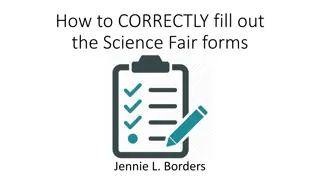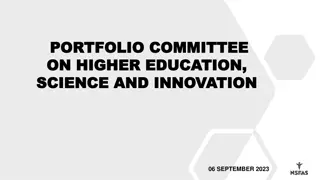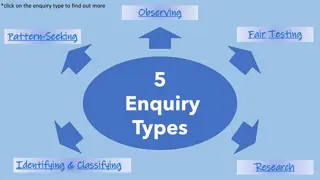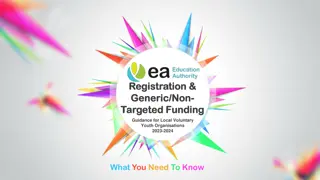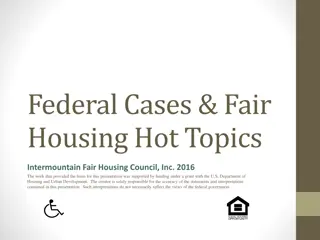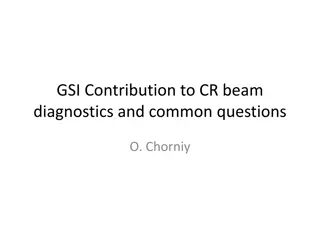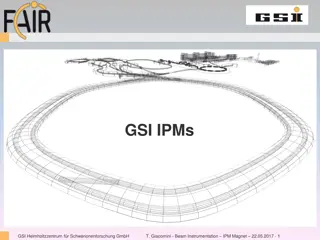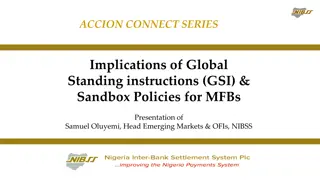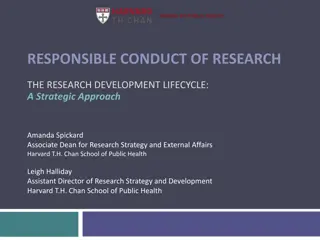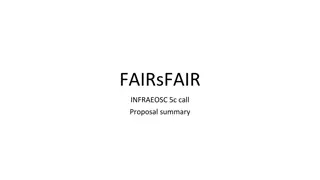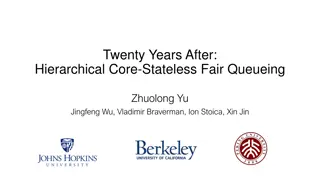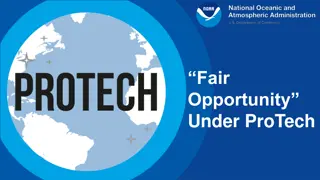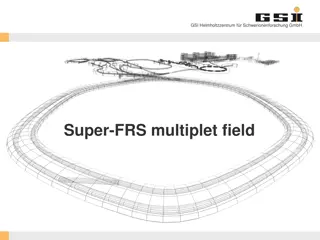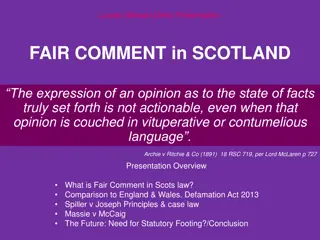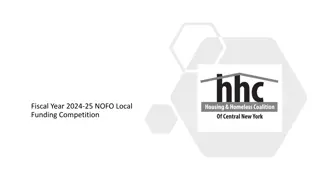Exploring Open Science and Research Funding Issues at GSI/FAIR under Oxana Ivanova's Insights
Open Science presents interconnected fields like Open Access, Research Data, and Scholarly Communication. Research funding at GSI/FAIR involves strategic collaborations and fund distribution from regional to international levels. The program at GSI aligns with Open-Access standards, focusing on making research results accessible for reuse. Helmhotz community emphasizes Open Science policies and guidelines for handling research data, promoting usability and accessibility.
Download Presentation

Please find below an Image/Link to download the presentation.
The content on the website is provided AS IS for your information and personal use only. It may not be sold, licensed, or shared on other websites without obtaining consent from the author. Download presentation by click this link. If you encounter any issues during the download, it is possible that the publisher has removed the file from their server.
E N D
Presentation Transcript
Open Science Open Science issues in Research Funding Research Funding issues in Oxana Ivanova, Grant Office (GRO)
Open Science Open Science Open Science encompasses several interlinked fields of action: Open Access to publications i.e. online access to scientific information (articles) that is publicly accessible, free of charge and reusable Open Research data e.g. EOSC under FAIR Principles Open Scholarly communication e.g. open peer reviews technical & socio-cultural challenges (also for research funding) Quelle: Open Science Monitor EC https://ec.europa.eu/info/research-and-innovation_en 2
Research Research funding funding at GSI / FAIR at GSI / FAIR R&D Program, where GSI acts as a funding agency - strategic cooperation with Goethe University Frankfurt, Technical University Darmstadt, Justus Liebig University Giessen, Heidelberg University and Frankfurt Institute for Advanced Studies (FIAS). Regional funds, e.g. Loewe program and EU-funds distributed/handled by federal states (EFRE, ESF and REACT-EU) National (German) funding, e.g. DFG, BMBF, https://www.gsi.de/work/organisation/stabsabteilungen_stellen/drittmittelstelle/drittmittelprojekte_bei _gsifair/nationale_forschungsfoerderung International, mainly EU-funding, provided by the European Commission https://www.gsi.de/work/organisation/stabsabteilungen_stellen/drittmittelstelle/drittmittelprojekte_bei _gsifair/eu_foerderung_im_horizont2020 EFRE - Europ ische Fonds f r regionale Entwicklung (EFRE), ESF - Europ ischer Sozialfonds f r Deutschland REACT-EU - Recovery Assistance for Cohesion and the Territories of Europe 3
Open Science (Open Access) in R&D Open Science (Open Access) in R&D- -program program Forschungseinrichtungen verpflichten sich zu der Open-Access-Richtlinie der Helmholtz- Gemeinschaft: https://os.helmholtz.de/open-science-in-der-helmholtz-gemeinschaft/open-access/open- access-richtlinien/open-access-richtlinie-der-helmholtz-gemeinschaft-2016/ die Ergebnisse der eigenen Arbeit der Wissenschaft, der Wirtschaft und der Gesellschaft m glichst barrierefrei zur Nachnutzung ffentlich zug nglich zu machen, fordern die Helmholtz-Zentren die bei ihnen t tigen Mitarbeiterinnen und Mitarbeiter auf, die von ihnen im Rahmen ihrer T tigkeit f r die Helmholtz-Gemeinschaft allein oder gemeinsam mit anderen Forschenden erstellten Publikationen Open Access zug nglich und nachnutzbar zu machen. More about R&D program of GSI can be found here (in german only): https://www.gsi.de/en/work/organisation/staff_units/grant_office/rd_program 4
more more Helmholtz Helmholtz Policies Policies/ /Recomendations Recomendations Research Data Policies of the Helmholtz Centers https://os.helmholtz.de/en/open-science-in-the-helmholtz-association/eng-open-research- data/research-data-policies-of-the-helmholtz-centers/ Position paper Making information resources more usable https://gfzpublic.gfz- potsdam.de/pubman/faces/ViewItemOverviewPage.jsp?itemId=item_5006071 Recommendations for guidelines of the Helmholtz Centers for handling research data (in German only: Empfehlungen f r Richtlinien der Helmholtz-Zentren zum Umgang mit Forschungsdaten ) https://gfzpublic.gfz- potsdam.de/pubman/faces/ViewItemOverviewPage.jsp?itemId=item_3903898 5
Open Access in National ( Open Access in National (german german) ) funding funding Die Bewilligungsempf ngerinnen und Bewilligungsempf nger der DFG sind aufgefordert, ihre Projektergebnisse zum Zweck der wissenschaftsad quaten Kommunikation im Open Access zu ver ffentlichen. Die entsprechenden Beitr ge sollten entweder direkt in qualit tsgesicherten bzw. fachlich anerkannten Open-Access-Zeitschriften oder auf Open-Access-Plattformen publiziert oder zus tzlich zur Verlagspublikation m glichst ohne Zeitverzug in disziplinspezifische oder institutionelle elektronische Archive (Repositorien) eingestellt werden . Source: DFG Verwendungsrichtlinien, pp 42-43. https://www.dfg.de/formulare/2_10/index.jsp Wenn der Zuwendungsempf nger seine aus dem Forschungsvorhaben resultierenden Ergebnisse als Beitrag in einer wissenschaftlichen Zeitschrift ver ffentlicht, so soll dies so erfolgen, dass der ffentlichkeit der unentgeltliche elektronische Zugriff (Open-Access) auf den Beitrag m glich ist. Dies kann dadurch erfolgen, dass der Beitrag in einer der ffentlichkeit unentgeltlich zug nglichen elektronischen Zeitschrift ver ffentlicht wird. Erscheint der Beitrag zun chst nicht in einer der ffentlichkeit unentgeltlich elektronisch zug nglichen Zeitschrift, so soll der Beitrag gegebenenfalls nach Ablauf einer angemessenen Frist (Embargofrist) der ffentlichkeit unentgeltlich elektronisch zug nglich gemacht werden (Zweitver ffentlichung). Source: https://www.bmbf.de/bmbf/shareddocs/bekanntmachungen/de/2021/07/2021-07-29-Bekanntmachung- Zuwendungen-SiFo.html DFG - Deutsche Forschungsgemeinschaft, BMBF - Bundesministerium f r Bildung und Forschung More detailed information can be provided by Svetlana Ktitareva, GRO (phone 2040) 6
Open Science in EU Open Science in EU funding funding Open Science has been an integral part of the EU's research policy since 2015 and, based on this, of funding measures in the EU Framework Programmes for Research and Innovation. As a subset of Open Science, an Open Access policy was already introduced in 2008 as a pilot measure in the 7th EU Research Framework Programme and has been successively expanded since then, for example with the Open Data pilot since 2014 in Horizon 2020. https://www.kowi.de/en/kowi/Horizon-Europe/horizon-europe/tabid-746/open-science.aspx A successful proposal: Scientific-technical excellence is key, but don t forget the other aspects (e.g. Open Science). European Commission 2022 Standard application form (Version from Jan.2022): Publications, in particular journal articles, are expected to be open access. Datasets are expected to be FAIR* and as open as possible, as closed as necessary . (*) FAIR principles: Findability, Accessibility, Interoperability, Reusability. 7
Open Science: research data management Open Science: research data management Requirement 2021-2027 (annotated model grant agreement, AMGA from Nov.2021): The beneficiaries must manage the digital research data generated in the action ( data ) responsibly, in line with the FAIR principles and by taking all of the following actions: - establish a data management plan ( DMP ) (and regularly update it) - as soon as possible and within the deadlines set out in the DMP, deposit the data in a trusted repository; if required in the call conditions, this repository must be federated in the EOSC in compliance with EOSC requirements Unless it goes against their legitimate interests, the beneficiaries must as soon as feasible (but not before a decision on their possible protection) disseminate their results (i.e. make them public). .if open access is not provided (to some or all data*), this must be justified in the DMP - provide information via the repository about any research output or any other tools and instruments needed to re-use or validate the data. (*) There is no need to guarantee Open Access to research data if this conflicts with the legitimate (e.g. commercial) interests of the project partners concerned, or if there are other restrictions, e.g. due to data protection regulations, security regulations or intellectual property rights. 8
Open Access in EU Open Access in EU funding funding: HEU : HEU vs vs H2020 H2020 Whereas Horizon 2020 still provided for embargo periods of six or twelve months, after which a publication had to be freely accessible, Horizon Europe requires immediate Open Access to publications that have undergone a peer- review process. Details on publication, licences and metadata are set out in the Grant Agreement. Open Access to research data includes the mandatory creation of a data management plan (DMP) for each project and the storage and provision of the data in a relevant repository. Authors must ensure, among other things*, that they retain sufficient intellectual property rights to meet their obligations. Costs incurred in the context of an Open Access publication are chargeable to the project, provided the publication is in a full Open Access venue. https://www.kowi.de/kowi/projektmanagement/verbreitung-verwertung/open-access- datenmanagement/open-access-und-forschungsdatenmanagement.aspx H2020 Horizon 2020, HEU Horizon Europe (current) research and innovation program(s) by the European Commission (*) Some call conditions impose additional obligations regarding open science practices. 9
Large Large scale perspective perspective on European Cloud initiative (EOSC) on European Cloud initiative (EOSC) scale Research Research Infrastructures Infrastructures (RIs) (RIs) The European Commission announced on 14 March 2018 the adoption of the Implementation Roadmap for the European Science Cloud - results and available evidence from an extensive and conclusive consultation process that started with the publication of the Communication: European Cloud initiative (COM(2016)178) in April 2016. The consultation upheld the intervention logic presented in the Communication, to create a fit for purpose pan- European federation of research data infrastructures, with a view to moving from the current fragmentation to a situation where data is easy to store, find, share and re-use. On the basis of the consultation, the implementation Roadmap gives and overview of six actions lines for the implementation of the EOSC: a) architecture, b) data, c) services, d) access & interfaces, e) rules and f) governance. Specifically regarding the latter, the Roadmap presents a governance framework and a governance structure that emerged from the consultation, as a basis for further discussion with Member States. This was foreseen explicitly by the Communication. See http://ec.europa.eu/research/openscience/index.cfm?pg=home RIs are the forerunner of data exploitation, science digitalization, data engineering and data management, and thus, having an indispensable role for the development of the European Open Science Cloud. In addition, RIs have an important and growing role in policy-making, as they can contribute to cross-sectoral strategies and to increasing the coherence between European, national and regional priorities and policies. Sources: https://www.esfri.eu/project-landmarks-news/implementation-roadmap-european-open-science-cloud; https://roadmap2021.esfri.eu/ 10
EU ( EU (Horizon Horizon Europe) Europe) requirements requirements There is an obligation to observe the FAIR principles (including the submission of corresponding data management plans) as well as to ensure Open Access to data (Open Data), albeit with opt-out mechanisms (for Open Data) in the case of interests worthy of protection (e.g. personal data, trade secrets, etc.). Open Access requirements includes the mandatory creation of a data management plan for each project and the storage and provision of the data in a relevant repository. Details on publication, licences and metadata are set out in the Grant Agreement. Additional commitments on Open Access to research results may be set out in the Work Programmes. Read carefully or ask Grant Office for support (best do both!) 11
Examples Examples in in upcoming upcoming individual individual calls calls (Sept.22) (Sept.22) Marie Sk odowska-Curie Postdoctoral Fellowships(commented template): 12
Examples Examples in in upcoming upcoming individual individual calls calls (Oct.22) (Oct.22) European Research Council (upcoming deadline for starting grant): The mission of the ERC is to support excellent research in all fields of science and scholarship. The main outputs of this research are new knowledge, ideas and understanding, which the ERC expects its grantees to publish in peer-reviewed articles and monographs. The ERC considers that providing free online access to these materials is the most effective way of ensuring that the fruits of the research it funds can be accessed, read, and used as the basis for further research. As an ERC grant holder funded under a Horizon Europe ERC Work Programme, you have to ensure open access to peer-reviewed scientific publications relating to the results of your ERC-funded project. Specifically, At the latest at the time of publication, a machine-readable electronic copy of the published version (VoR), or the final peer-reviewed manuscript accepted for publication (AAM), must be deposited in a trusted repository for scientific publications. Immediate open access to the deposited publication must be provided via the repository, under the latest available version of the Creative Commons Attribution International Licence (CC BY) or a licence with equivalent rights. For long-text publications such as monographs and edited volumes (but not book chapters), the licence may exclude commercial uses and/or derivative works (such as CC BY-NC, CC BY-ND, CC BY-NC-ND). The authors of the publication (or the institution that is the legal beneficiary of the ERC grant) must retain sufficient intellectual property rights to allow compliance with the requirements of the grant agreement. Information must be provided via the repository about any research outputs or any other tools and instruments needed to validate the conclusions of the scientific publication. Note that the metadata of deposited publications must also be open under a Creative Common Public Domain Dedication (CC 0) or equivalent, and must be in line with the FAIR principles (Findable, Accessible, Interoperable and Re-usable), in particular machine-actionable. Source: https://erc.europa.eu/managing-your-project/open-science; see also Guide for Peer Reviewers; template: https://ec.europa.eu/info/funding-tenders/opportunities/docs/2021-2027/horizon/temp-form/af/af_he-erc-stg_en.pdf 13
Research data management Research data management (EU (EU templates templates) ) RDM is mandatory in Horizon Europe for projects generating or reusing data. If you expect to generate or reuse data and/or other research outputs (except for publications), you are required to outline in a maximum of one page how these will be managed. Further details on this are provided in the proposal template in the relevant section on open science. A full data management plan (DMP) is not required at submission stage. For those work programmes that require the use of the European Open Science Cloud (EOSC) federated repositories, proposers should explicitly discuss the use of such repositories in their proposals. By exception, in cases of a public emergency and if the work programme requires so, you should submit a full DMP already with submission of proposals or at the latest by the signature of the grant agreement. A template for a DMP is provided under the reporting templates in the reference documents of theFunding and Tenders portal of the European Commission. Source: https://ec.europa.eu/info/funding-tenders/opportunities/docs/2021- 2027/horizon/guidance/programme-guide_horizon_en.pdf 14
Data Data management management plan (DMP): plan (DMP): general general remarks remarks The DMP has to be seen as starting point for the discussion with the project partners: DMP (deliverable at project month 6) reflects the procedures planned by the work packages at the beginning of the project and should be updated during project lifetime, depending on production/collection of data according to the definition of the commission. Picture source: https://www.kowi.de/Portaldata/2/Resources/KoWi/Factsheet_Open_Access_Horizon_2020.pdf 15 see EU slides and video for evaluators How to evaluate Open Science Proposals under https://www.youtube.com/watch?v=EiJ8RaD3WBw
Data Data management management plan (DMP plan (DMP draft draft) @ GSI/FAIR ) @ GSI/FAIR DMP draft source: Andrew Mistry 16
Data Data management management plan (DMP plan (DMP draft draft) @ GSI/FAIR ) @ GSI/FAIR DMP draft source: Andrew Mistry 17
Open science and intellectual property rights Open science and intellectual property rights Open Science (OS) is considered the new paradigm for science and knowledge dissemination. OS fosters cooperative work and new ways of distributing knowledge by promoting effectinve data sharing (as early and broadly as possible) and a dynamic exchange of research outcomes, not only publications. On the other hand, intellectual property (IP) legislation seeks to balance the moral and econmical rights of creators and inventors with the wider interests and needs of society. Source: Recent Executive Summary (May 2022) https://op.europa.eu/en/publication-detail/-/publication/42d27e04-b715-11ec-b6f4- 01aa75ed71a1/language-en/format-PDF/source-260745036 18
Open innovation, Open innovation, open science open science, open to the world , open to the world EU-Vision 2016 https://digital-strategy.ec.europa.eu/en/library/open-innovation-open-science-open-world Open science is a policy priority for the European Commission and the standard method of working under its research and innovation funding programmes as it improves the quality, efficiency and responsiveness of research. When researchers share knowledge and data as early as possible in the research process with all relevant actors it helps diffuse the latest knowledge. And when partners from across academia, industry, public authorities and citizen groups are invited to participate in the research and innovation process, creativity and trust in science increases. That is why the Commission requires beneficiaries of research and innovation funding to make their publications available in open access and make their data as open as possible and as closed as necessary. It recognises and rewards the participation of citizens and end users. https://ec.europa.eu/info/research-and-innovation/strategy/strategy-2020-2024/our-digital-future/open-science_en 19
Thank Thank YOU YOU for for YOUR Attention! YOUR Attention! In case of question: now or any time afterwards . (phone 1396) Grant Office @ GSI / FAIR is always happy to help you with your application for regional /national / international (EU) funding. 20
Actuall Actuall EU EU funding funding programs programs and and calls calls https://ec.europa.eu/info/research-and-innovation/funding/funding- opportunities/funding-programmes-and-open-calls_en 21



